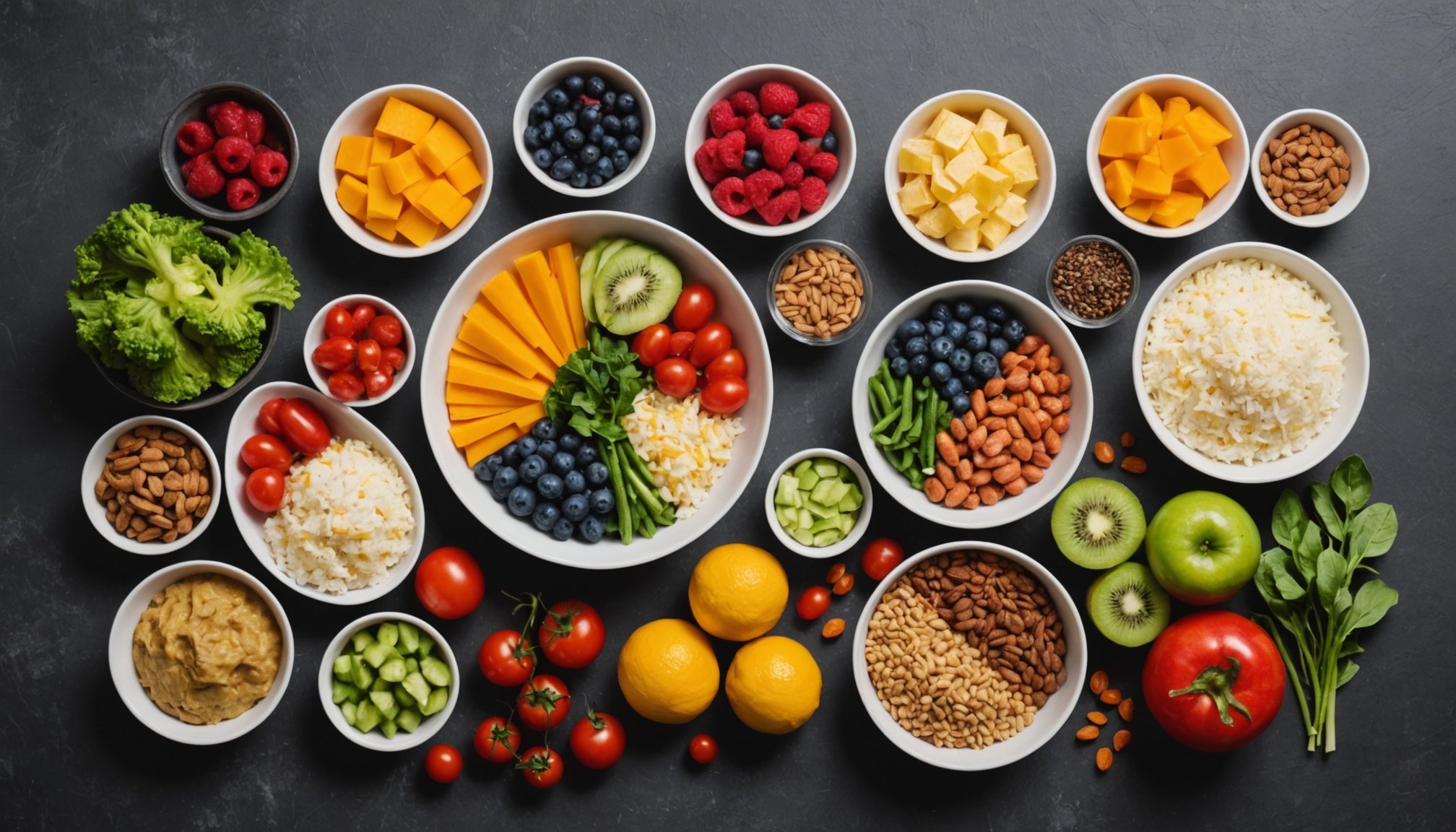Understanding Diabetes and Nutrition
Diabetes is a condition characterized by high blood glucose levels, which affects millions globally. To manage it effectively, understanding the impact on nutrition is paramount. Nutrition plays a critical role in diabetes management, as it directly influences blood sugar levels. This makes it vital to adopt a balanced diet to maintain optimal health.
A balanced diet consists of appropriate portions of carbohydrates, proteins, and fats. This is crucial for people with diabetes, as it helps in regulating blood glucose levels. Consuming a variety of fruits, vegetables, whole grains, and lean proteins can be beneficial. Additionally, monitoring portion sizes and making informed food choices aids in preventing spikes in blood sugar.
Also read : Effective Exercise Strategies for UK Residents with Arthritis: Mastering Chronic Pain Management
In the UK, specific nutritional guidelines have been established to assist those with diabetes. The NHS advises individuals to avoid sugary foods and drinks, opting instead for high-fiber meals that release energy slowly. This approach helps maintain steady blood sugar levels throughout the day. Additionally, incorporating regular meal times and snacks can support this balance.
By adhering to a diabetes nutrition plan, individuals can significantly improve their quality of life. It’s essential to work with healthcare professionals to create a personalised balanced diet, promoting a proactive approach to diabetes management.
Also read : Crafting an Impactful 30-Minute Home Cardio Workout for UK Fitness Buffs: Your Ultimate Guide
Key Components of a Balanced Diet Plan
Achieving a balanced diet involves understanding the integral roles played by various nutrients. Carbohydrates, proteins, and fats are three primary macronutrients. They are essential in maintaining health, especially for individuals managing diabetes. Carbohydrates impact blood sugar levels; it is vital to choose complex carbs like whole grains, as they provide a gradual release of glucose into the bloodstream.
Proteins serve to build and repair tissues, making them indispensable. Lean proteins such as chicken, fish, and legumes are beneficial in controlling hunger and supporting muscle maintenance. Fats, particularly unsaturated fats, are necessary for overall health and hormone production. Nuts, avocados, and olive oil are excellent sources of these healthy fats.
In addition to macronutrients, including key micronutrients is crucial. Essential vitamins and minerals, such as Vitamin D, calcium, and magnesium, play significant roles in blood sugar regulation and bone health.
Moreover, fiber is often underestimated yet plays a crucial role in a balanced diet. It aids in digestion and helps manage blood sugar levels by slowing glucose absorption. Sources of fiber include fruits, vegetables, and whole grains. Collectively, these elements foster a comprehensive approach to diabetes management, ensuring optimum health and nutrition.
Recommended Foods for Diabetics
Understanding what to eat is crucial for maintaining balanced blood sugar levels. Let’s explore some of the most suitable diabetic-friendly foods available in the UK.
Vegetables and Fruits
A diet rich in vegetables and fruits is fundamental for diabetics. Vegetables like spinach, kale, and broccoli are low in carbohydrates and high in fiber, making them excellent UK dietary options. Fruits such as berries, apples, and pears can be enjoyed in moderation due to their natural sugars. In particular, opting for fruits with a low glycemic index (GI) can prevent significant sugar spikes, keeping levels steady. This makes such healthy food choices both practical and beneficial for overall health.
Grains and Legumes
Grains and legumes are important for diabetic individuals, offering vital nutrients. Whole grains like oats and quinoa are preferable to refined grains. They deliver consistent energy and maintain glucose stability. Legumes—chickpeas and lentils, for example—are rich in protein and fiber, supporting blood sugar control. Opt for unprocessed grains and legumes to maximise nutritional benefits.
Proteins and Dairy
Selecting the right proteins and dairy is pivotal in a diabetic-friendly diet. Lean meats like chicken and fish supply essential amino acids without excessive saturated fats. Plant-based options like tofu and tempeh are equally formidable. For dairy, low-fat options such as Greek yogurt can supply necessary calcium while avoiding unnecessary fat intake, aiding in maintaining a balanced and healthy diet.
Meal Planning Tips for Diabetics
Creating a meal plan suited to diabetic needs can significantly improve health management and lifestyle. Begin by understanding your dietary requirements, as perfect portion control is essential. Portion control involves measuring your food to ensure you consume precise quantities that suit your energy requirements. By doing so, it becomes easier to regulate blood sugar levels and maintain a healthy weight.
Incorporating healthy snacks into your diet is another pivotal aspect of meal planning. Small, balanced snacks help maintain energy levels and prevent overeating during main meals. Opt for snacks that combine fibre, protein, and healthy fats to provide sustained energy and satiety. Examples include nuts, yogurt, or a piece of fruit with peanut butter.
Moreover, remember to include diverse food groups within your meal planning to ensure a balanced intake of nutrients. For instance, lean proteins, whole grains, and a variety of fruits and vegetables offer necessary vitamins and minerals while aiding in portion control.
When planning meals, it is also crucial to track carbohydrate intake, as not all carbohydrates affect blood sugar similarly. Balancing carbohydrates with proteins and other nutrients can optimise health outcomes for diabetics, making meal planning an effective strategy to manage diabetes.
Sample Meal Plans for Diabetics
Creating a well-structured daily diet can be crucial for managing diabetes effectively. Incorporating diverse meal examples ensures a balanced intake of nutrients throughout the day.
Sample Breakfast Ideas
Starting your day with the right breakfast can significantly impact your blood sugar levels. Imagine indulging in oatmeal mixed with nuts and berries. It’s a simple yet effective option that balances carbohydrates with fibre and healthy fats. Another delightful choice might be scrambled eggs accompanied by whole-grain toast. The protein keeps you full, avoiding spikes in glucose. For those seeking variety, consider a Greek yogurt parfait with chia seeds and sliced fruit—a refreshing and nutritious start to the day.
Sample Lunch Recipes
Midday meals can be both healthy and satisfying. A grilled chicken salad, adorned with mixed greens and a handful of quinoa, offers the perfect balance of protein and carbs. Alternatively, try a veggie-packed wrap using a whole-wheat tortilla. Fill it with hummus, spinach, and bell peppers for a vibrant and flavourful meal. Another enticing idea is a lentil soup paired with a small whole-grain roll, warming and comforting while also being nutritious.
Sample Dinner Dishes
Dinner provides an opportunity to round out your daily diet nicely. Consider baked salmon accompanied by roasted vegetables—a powerhouse of omega-3s and essential vitamins. Another evening option is a stir-fry with tofu and a colourful array of vegetables served over brown rice. For a classic dish, try a turkey mince and zucchini lasagne. These meal examples are crafted to maintain blood sugar levels without sacrificing taste.
Diabetes Management Strategies through Diet
For effective diabetes management, maintaining a balanced diet is critical. Various dietary strategies play a pivotal role in blood sugar control by influencing the body’s glucose levels. Incorporating high-fibre foods, like whole grains and vegetables, can slow sugar absorption, aiding in the stabilization of blood sugar levels. Additionally, selecting low glycemic index meals is essential, as they prevent drastic spikes in glucose.
An often overlooked aspect of managing diabetes is the diligent monitoring of blood sugar levels in relation to food intake. By consistently checking blood glucose before and after meals, individuals can better understand how their bodies respond to certain foods. Using a blood glucose meter, for example, allows for real-time insights, leading to more informed dietary choices and greater overall control.
Collaborating with healthcare professionals is indispensable in creating personalized dietary plans tailored to individual needs. Dieticians and endocrinologists can recommend specific foods and meal timings that effectively manage blood sugar levels while considering personal preferences and lifestyle factors. Such tailored plans can lead to sustained improvements in general well-being.
Ultimately, a strategic combination of thoughtful dietary choices and precise health monitoring underpins successful diabetes management, empowering individuals to take charge of their health proactively. Building a balanced approach facilitates long-term blood sugar control and enhances quality of life.
UK-Specific Resources for Diabetics
Navigating the landscape of diabetes resources in the UK can significantly enhance the management of this condition. Numerous organizations offer support and information specifically tailored for those living with diabetes. The Diabetes UK charity is a primary resource, offering expert advice, community support, and advocacy. Their website provides a wealth of information on managing diabetes effectively.
In addition, NHS health services offer comprehensive support. Diabetics in the UK can access free consultations with dietitians and diabetes specialists via their local GP. Dietary support is crucial for managing blood sugar levels, and the NHS provides personalized nutrition plans to meet individual needs.
Moreover, community support plays a vital role in diabetes management. Local diabetic support groups allow individuals to share experiences, advice, and encouragement. Engaging with others who understand the daily challenges of diabetes fosters a supportive community atmosphere.
Healthcare providers can direct individuals to these community support and groups. Participating in such networks provides emotional support and practical tips for dealing with the condition. Peer experiences can illuminate alternative strategies for coping, offering innovative lifestyle and dietary suggestions.
By leveraging these UK-specific resources, diabetics can gain control over their condition and improve their quality of life.
Culturally Relevant Recipes and Dietary Restrictions
Incorporating cultural recipes into balanced meal plans is an enriching way to respect and celebrate one’s heritage while maintaining health. The key is to enjoy these beloved dishes while being mindful of any dietary restrictions that may apply. Many traditional foods are naturally diabetic-friendly, adding vibrancy and flavor in meals without compromising dietary guidelines.
Adapting traditional recipes for diabetes-friendly options can be a rewarding endeavor. This might involve substituting ingredients or altering cooking methods. For instance, swapping white rice for quinoa not only reduces carbohydrate intake but also increases fibre and protein. Such changes ensure you continue relishing your favourite dishes while safeguarding your health.
Understanding potential dietary restrictions is crucial when embracing cultural foods. Some cultural practices may entail fasting, which affects blood sugar levels in individuals with diabetes. Moreover, some staple ingredients in a cultural diet might be high in sodium or carbohydrates, posing additional challenges. It is essential to be aware of these factors and find appropriate replacements or modifications. Consulting with dietitians familiar with specific cultural recipes can provide valuable insight. They can suggest ways to alter meals that align with both cultural traditions and health needs, ensuring that both identity and wellness are nurtured.











